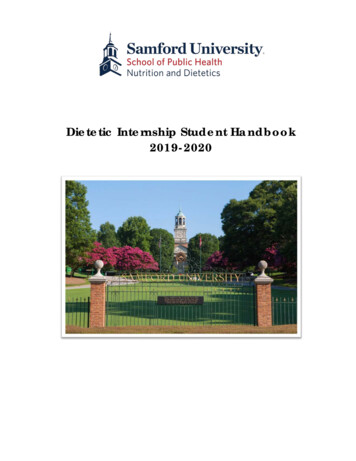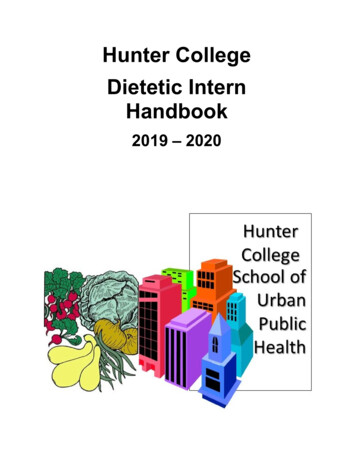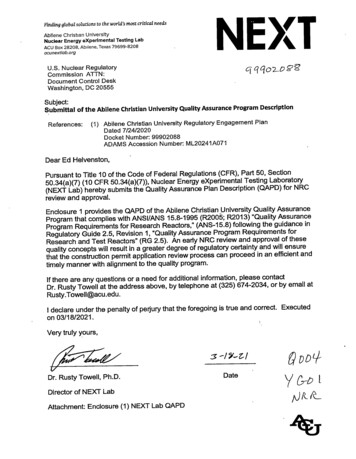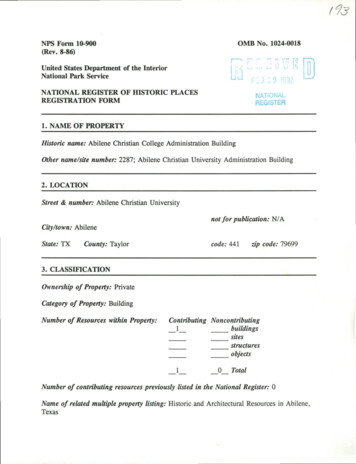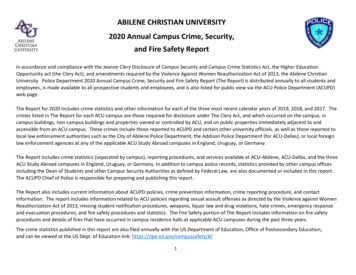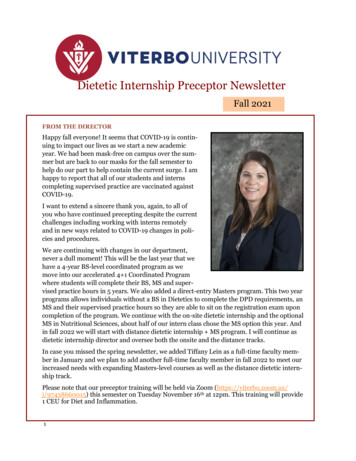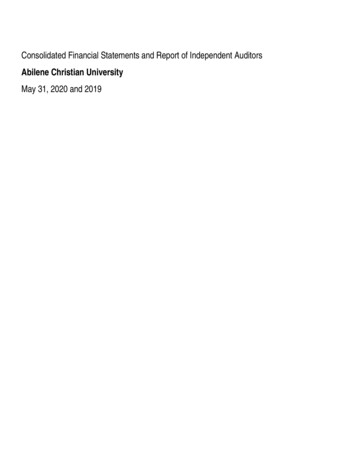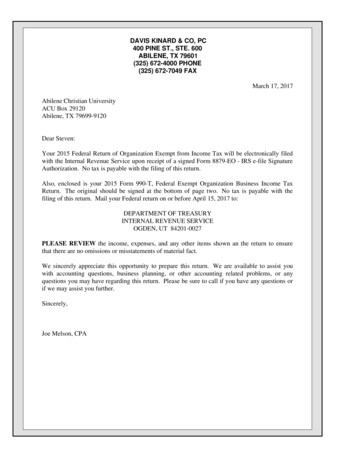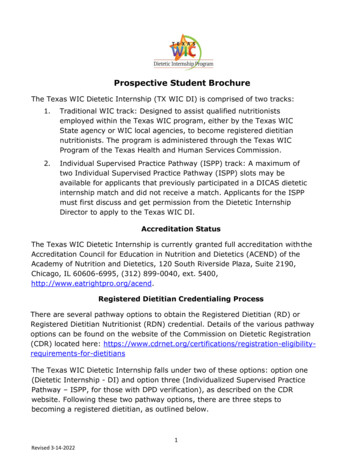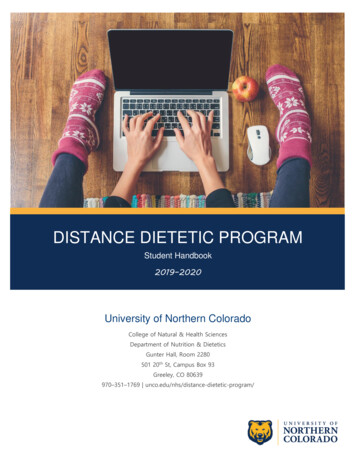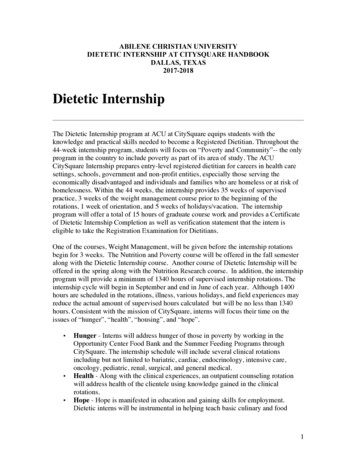
Transcription
ABILENE CHRISTIAN UNIVERSITYDIETETIC INTERNSHIP AT CITYSQUARE HANDBOOKDALLAS, TEXAS2017-2018Dietetic InternshipThe Dietetic Internship program at ACU at CitySquare equips students with theknowledge and practical skills needed to become a Registered Dietitian. Throughout the44-week internship program, students will focus on “Poverty and Community”-- the onlyprogram in the country to include poverty as part of its area of study. The ACUCitySquare Internship prepares entry-level registered dietitian for careers in health caresettings, schools, government and non-profit entities, especially those serving theeconomically disadvantaged and individuals and families who are homeless or at risk ofhomelessness. Within the 44 weeks, the internship provides 35 weeks of supervisedpractice, 3 weeks of the weight management course prior to the beginning of therotations, 1 week of orientation, and 5 weeks of holidays/vacation. The internshipprogram will offer a total of 15 hours of graduate course work and provides a Certificateof Dietetic Internship Completion as well as verification statement that the intern iseligible to take the Registration Examination for Dietitians.One of the courses, Weight Management, will be given before the internship rotationsbegin for 3 weeks. The Nutrition and Poverty course will be offered in the fall semesteralong with the Dietetic Internship course. Another course of Dietetic Internship will beoffered in the spring along with the Nutrition Research course. In addition, the internshipprogram will provide a minimum of 1340 hours of supervised internship rotations. Theinternship cycle will begin in September and end in June of each year. Although 1400hours are scheduled in the rotations, illness, various holidays, and field experiences mayreduce the actual amount of supervised hours calculated but will be no less than 1340hours. Consistent with the mission of CitySquare, interns will focus their time on theissues of “hunger”, “health”, “housing”, and “hope”. Hunger - Interns will address hunger of those in poverty by working in theOpportunity Center Food Bank and the Summer Feeding Programs throughCitySquare. The internship schedule will include several clinical rotationsincluding but not limited to bariatric, cardiac, endocrinology, intensive care,oncology, pediatric, renal, surgical, and general medical.Health - Along with the clinical experiences, an outpatient counseling rotationwill address health of the clientele using knowledge gained in the clinicalrotations.Hope - Hope is manifested in education and gaining skills for employment.Dietetic interns will be instrumental in helping teach basic culinary and food1
service skills in the food production kitchen and cafe at the Opportunity Center atCitySquare.Housing - Indirectly, housing will be addressed through intern involvement inteaching basic selection, procurement, and preparation of healthful meals forhome use in the CitySquare demonstration kitchen.This program has been granted Candidacy status as a part of the accreditation processwith the Accreditation Council for Education in Nutrition and Dietetics (ACEND).Abilene Christian University is accredited by the Southern Association of Colleges andSchools Commission on Colleges to award associate, baccalaureate, master’s anddoctoral degrees. Contact the Commission on Colleges at 1866 Southern Lane, Decatur,Ga. 30033-4097 or call 404-679-4500 for questions about the accreditation of ACU.Admissions RequirementsThe admission requirements for the ACU Dietetic Internship program:Complete an online ACU applicationSubmit a 25 application fee;Complete a supplemental application for Dietetic Internship; Submit any/all official transcript(s) in English (or translated to English) of allprevious college work (official means an original with the seal that comes directlyfrom the issuing institution to ACU). The transcript must indicate a bachelor'sdegree from a regionally accredited college or university;A bachelor’s degree in nutrition or related field;A cumulative undergraduate approximate 3.2 and a minimum grade of B inDidactic Program in Dietetics courses and supporting courses including thesciences, statistics, and management;Three letters of recommendation;Submit a personal statement which includes:Reason(s) you chose to apply to the ACU CitySquare InternshipYour professional goalsYour philosophy of working with the poor or economically disadvantagedHow faith impacts your professional goals and responsibilitiesWhat are your strengths that will help you to achieve your professional goalsWhat volunteer/work experience you have that impacts your ability to succeed inthis internship.Submit a personal resume; andApplicants must have completed Didactic Program in Dietetics requirements in anaccredited program as specified by the Accreditation Council for Education inNutrition and Dietetics (ACEND). Potential interns must submit an Academy ofNutrition and Dietetics Verification /statement or Declaration of Intent to2
Complete a Didactic Program in Dietetics (DPD) along with their completedapplication.Course RequirementsThe Dietetic Internship program provides 15 hours of graduate coursework:Weight Management (3 hrs)Dietetic Internship (2 3-hour courses)Nutrition and Poverty (3 hrs)Nutrition Research (3 hrs)Application DeadlinesTermFall 2017Application DeadlineFebruary 14, 2017Financial AidTuitionandFeesTuition (Includes 15 hours of graduate coursework and internship)Additional costs may be incurred for living expenses, use of a car to driveto rotations, a personal computer, printer, textbooks and supplies forgraduate courses, possible fingerprint or background check fees requiredby facilities; immunizations (Hepatitis A and B series, MMR X 2 orpositive titer , tetanus(Tdap within past 10 years), and Chicken Poximmunization or positive titer, TB tests (2 within one year) required byhealth care facilities, Academy of Nutrition and Dietetics Student MemberFee ( 50.00), Student professional liability Insurance ( 125.00). Eachstudent is required to have access to his or her own transportation to allrotations and to classes that meet at CitySquare on Akard Street in Dallas,Texas. Students are expected to provide adequate health insurance and carinsurance for protection during the internship.Interns must assume all responsibility for safety in travel to or from allassigned areas. Abilene Christian University assumes no liability for anytransportation-related accidents that might occur.Estimated Expenses to Intern: Application fee - 25 Academic tuition and fees and cost of DI rotations - 18,000 Apartment with roommate – approximately 600/month Food and household expenses – Varies Books and course-related expenses – approximately 8003
Travel expense – approximately 100-150/monthLiability insurance - 125/yearPhysical exam and immunization expenses – approximately 50200/yearFingerprint and background check fees - 50Drug testing - 45No cost for verification of student identity for distance learningNo uniform cost.FinancialAidFinancial Aid for the Dietetic Internship is limited the present time. Students may applyfor student loans through the ACU financial aid office (www.acu.edu). Some interns mayfind that they can work 10-15 hours a week (evenings and weekends) and still completetheir internship requirements. All students are encouraged to apply for scholarshipsthrough the Academy of Nutrition and Dietetics and the Texas Academy of Nutrition andDietetics.Faculty:Sheila Jones, Ph.D., R.D., L.D.Chair, Department of Kinesiology &NutritionAssociate ProfessorB.S., Texas A&M University, 1981M.S., Texas A&M University, 1988Dietetic Internship, Texas A&MUniversity, 1989L.D., 1989Ph.D., Texas Woman's University, 2005Phone: 325-674-2089Email: joness@acu.eduKay Williams, M.Ed., R.D., L.DDirector, Dietetic InternshipAssistant ProfessorB.S., Abilene Christian University, 1980M.Ed., Vanderbilt University, 1982Dietetic Internship, VanderbiltUniversity MedicalCenter, 1982Phone: 254-744-3707Email: jkw14a@acu.edu4
Martha Smallwood, Ed.D., R.D.,L.D.Assistant ProfessorB.S., Abilene Christian University, 1970M.S., Texas Tech University, 1973Dietetic Internship, Houston VAHospital, 1972Ed.D., Texas Tech Univeristy, 2011Phone: 325-674-2874Email: mts03d@acu.eduCompletion RequirementsEach intern must successfully complete all supervised practice rotations and graduatecourses associated with the DI. The Abilene Christian University Dietetic Internshipdoes not have a policy for assessing prior learning or competence. No credit is given forprior learning experiences or competence. The maximum amount of time for completingall DI requirements is 66 weeks from the time the student begins the internship.Withdrawal and Refund of Tuition and FeesWithdrawing from a Course Students must officially withdraw from a course or the Dietetic Internship byinitiating a withdrawal form. A withdrawal grade for the course will appear on the transcript. Refunds of tuition will be made according to the Tuition Refund Schedule (above). Fees are non-refundable after the add/drop period.Tuition refunds on intensive courses: Refunds for intensive courses not specificallylisted above are subject to the refund schedule for the term in which the course is taught,regardless of the actual date the course begins. For example, an intensive course taughtduring the fall term must be dropped by Day 5 of the fall term for a 100% refund, by Day12 for an 80% refund, or by Day 15 for a 60% refund, per the schedule above for Fall andSpring Terms.Withdrawing from the InternshipPolicies and Procedures Regarding the Return of Federal Title IV and InstitutionalFundsAbilene Christian University calculates and returns Federal Title IV funds according to5
Federal Title IV policy 34 CRF 668.22. The amount of Title IV funds (other than FederalWork-Study) that must be returned to the Title IV programs is based solely on the lengthof time the student was enrolled before withdrawing. This policy is effective for completeor full withdrawal from a semester in which the student receives Title IV federal funds.If the student withdraws before 60 percent of the semester has elapsed, a percentage ofTitle IV funds will be returned to the federal program based on the length of time thestudent is enrolled prior to withdrawal. For example, if the student withdraws when 50percent of the semester has elapsed, 50 percent of Title IV funds will be returned to thefederal programs. After 60 percent of the semester has elapsed, the student is consideredto have earned all aid received for the semester.The return of Federal Title IV funds depends upon the date the student withdraws duringthe semester.Withdrawal date is defined as one of the following:The date the student began the withdrawal process; The date the student otherwise provided the school with official notification of theintent to withdraw; For the student who does not begin the university’s withdrawal process or notifythe school of the intent to withdraw, the mid-point of the payment period or periodof enrollment for which Title IV assistance was disbursed (unless the university candocument a later date); or The withdrawal date is determined from class attendance records. If a student stops attending class, or participating in planned rotations, federalregulations require that ACU consider the student withdrawn for financial aidpurposes.The dietetic interns should understand that voluntary withdrawal from the internshipprogram generally is permanent, and there would not be a possibility for re-admission.Academic Program CalendarAn academic calendar and schedule bulletin for the Dietetic Internship is available tostudents online and in the office of the Director of the Dietetic Internship. It is alsoavailable in the office of the Chair, Department of Kinesiology and Nutrition and in theoffice of the Dean of the College of Education and Human Services. Graduate coursesavailable required by Dietetic Interns are listed under the Kinesiology and Nutritionsection of the ACU catalog. Each course is required to provide students with a syllabuslisting dates with assignments, project due dates, activities, and vacations and holidays.6
A suggested layout of recommended courses and rotations for each semester of theDietetic Internship is provided to each graduate interested in applying to the internship atCitySquare.A sample schedule is shown below:Weeks1-34DatesAugust 4-22August 233-3435-363738-404242-44September 5-15September 18-October 6October 9-27October 30-Nov 3November 6-17November 20-24November27-Dec 8December 11-Jan 8January 8-19January 22-March 9March 12-16March 19-30April 2-13April 16-20April 23-May 11May 14-25May 29-June 16RotationWeight Management Course (Online)Orientation at CitySquare(Ackard St.)Meals on WheelsFreseniusMesquite Specialty HospitalResearchWeatherford Regional Medical CenterThanksgiving BreakWeatherford Regional Medical CenterChristmas BreakWeatherford Regional Medical CenterMesquite ISDSpring BreakMesquite ISDResearchHomeless ShelterOpportunity CenterWICFood on the MoveInformation About FERPAWhat is FERPA?The Family Educational Rights and Privacy Act (FERPA) is a Federal law designed toprotect the privacy of student education records. The law applies to current and formerstudents of any institution which received Federal funding, such as financial aid andgrants.When a student reaches the age of 18 or attends a school beyond the high school level,rights of access to educational records transfer to the student from the parent or guardian.Students to whom the rights have transferred are "eligible students." Once a student is in7
attendance at ACU, the rights have transferred to the eligible student and the parentalright of access no longer exists.A podcast has been developed to help explain FERPA.What Does FERPA Mean to Me?If you are a student, it means that no one outside of the University can access youracademic record without your permission. You must designate in writing that anotherperson may have access to your education record.If you are a parent, it means that your student must list you (or whomever he/she wishes)in writing, on the Education Record Information Release form. The form is for the solepurpose of giving permission for the person(s) listed to have information about thestudent's education record. The education record includes, but is not limited to, grades,financial aid information, and campus life information. The form, provided in a PDF fileat the link above, must be signed and submitted by the student to the Registrar's Office.Students may also retract the form (and thus, retract the right of access for the namedperson) at any time by coming to the Registrar's Office.Adobe Reader is required to view the form. Once downloaded, the file should be printed,signed by the student, and returned to the Registrar's Office.Annual Notification of FERPA RightsAnnually, Abilene Christian University informs students of the Family EducationalRights and Privacy Act of 1974, as amended. This act, with which the institution intendsto comply fully, was designated to protect the privacy of educational records, to establishthe right of students to inspect and review their education records, and to provideguidelines for the correction of inaccurate or misleading data through informal andformal hearings. Students also have the right to file complaints with the FamilyEducational Rights and Privacy Act office (FERPA) concerning alleged failures by theinstitution to comply with the Act.Local policy explains in detail the procedures to be used by the institution for compliancewith the provisions of the Act. Copies of the policy can be found in the Campus Lifeoffice.Disclosure of Student RecordsIn general, no personally identifiable information from a student’s education records willbe disclosed without written consent from the student. This includes, but is not limited to,grade reports, academic schedule information and transcripts. Two exceptions may,however, be made: (1) directory information will be released unless the student requeststhat it be withheld, as explained in the section below; (2) records may be disclosed to8
parents of students who depend upon them as defined by Internal Revenue Code 1986,Section 152.Access to Student Support Services, including health services, counseling and testingand financial aid resources.Most of the student support services, such as health and counseling are available on theACU campus in Abilene. However, counselors and staff are available to provide referralsand limited assistance through emails and telephone calls. Testing and financial aidresources may also be accessed through emails, phone, and technology such as distancelearning or Skype. Interns with identified needs should first contact the Director of theDietetic Internship for assistance in following up with these services.CitySquare Dietetic Internship Mission and GoalsMissionThe mission of the Abilene Christian University Dietetic Internship is to equipinterns who model Christian values to become Registered Dietitians/Nutritionists tolead and empower individuals, especially those with economic need, to achievebetter nutrition and healthier lifestyles.Goals and Objectives1) The program will prepare graduates to have commitment to utilize nutritionrelated knowledge to improve the quality of the health and well-being among thosewho have limited resources.This goal is congruent with the Dietetic Internship mission concerning helping those inpoverty.(Objective 1.1 of Goal 1 - Eighty percent of graduates will be offering services to those inneed in their church or their community)2) The program will prepare graduates to obtain employment in dietetics or relatedfield.This goal fits with the mission in the preparation of graduates for successful employmentin the field.Objective 2.1 of Goal 2 - One hundred percent of interns will successfully complete theinternship requirements within the time frame of the internship, or due to extenuatingcircumstances, within 150% of the time or 66 weeks)Objective 2.2 of Goal 2 – Eighty percent of graduates will obtain employment within 12months in dietetics or related field.Objective 2.3 of Goal 2 - Eighty percent of graduates over a 5 year period will pass theCDR credentialing exam for dietitian nutritionists within one year following first attempt.9
Objective 2.4 of Goal 2- 80% of program graduates will pass the CDR credentialingexam for dietitian nutritionists within 12 months of program completion.Objective 2.5 of Goal 2 - Eighty percent of surveys returned by employers ratedgraduates as meeting or exceeding entry level competencies and potential for leadership.Objective 2.6 of Goal 2- 50% of graduates will be employed in a job which involvesworking with the poor in their job setting within 2 years of graduation.The mission, goals, and objectives will be monitored at least annually for programeffectiveness.Internship RotationsInternship rotations vary from one day to several weeks. All are supervised by RDs or byprofessionals with appropriate credentials in their field (such as MSW as directors ofhomeless shelters.) The Internship begins in August of each Year and concludes at theend of June. Students take five 3-hour graduate courses during the year and receive acertificate at the end of the program.RotationWeightManagementOn- ice,Practice SiteWeeksSupervisedPracticeHours3CitySquare- egionalorotherLongTermCareorLTAC- nedRenalRotaion- Bank/OC1111340404044010
vertyandCommunitySuccessful Completion of Dietetic InternshipIn order to successfully complete the CitySquare Dietetic Internship, all interns mustreceive an A or B on the graduate courses, complete all rotation evaluation forms andpresent the completed and signed evaluation forms (including self-evaluations) to theDietetic Internship Director within the designated time frame; and have a satisfactoryrating or above on all evaluations. The Dietetic Internship director will provide additionalevaluations on projects and research that are required throughout the internship.After successfully completing the five graduate courses and dietetic internship rotationrequirements, the intern will be provided with a Certificate of Completion and aVerification Statement from the Academy of Nutrition and Dietetics indicating theireligibility to sit for the Registration Examination for Dietitians required for credentialing.State licensure may be gained after passing the Registration Examination for Dietitians,or the graduate may sit for a State Licensure Examination.POLICIES and PROCEDURESPreparation for RotationsImmunization and Other Requirements11
During orientation and throughout the Dietetic Internship Course, the Director of theDietetic Internship provides Interns with information obtained from Preceptors about therotations and the background information needed to perform all expected assignmentsand activities for each rotation.Each Intern is expected to provide the Dietetic Internship Director with a health statusreport including evidence of required immunizations and other health requirements ofrotation facilities, the results of a criminal background check and comprehensive drugscreen, and other information facilities may request in accordance with applicable law,including, but not limited to, the Fair Credit Reporting Act. The Internship Director willthen provide the necessary information to facilities. The facilities have very specificrequirements for interns, most of which are listed below, but these can vary depending onthe rotation:(Immunizations and other requirements are submitted to Castle Branch. Moreinformation about Castle Branch will be provided in an email after acceptance to theinternship.)Childhood vaccinations from health department or Medical Clinic ( a school’s nursingimmunization form is not acceptable)Varicella- either positive titer or 2 doses of the vaccineHep A or positive titerHep B or positive titer2 MMR’sTdap vaccine within the past 10 yearsFlu vaccine( you will need to get this in September since it is seasonal)Do these in May-July, the summer before internship beginsTB tests: You must have 2 negative tests within the past year from the time you startyour clinical rotations, so please do not do these until May and July. Each one of thesemust have the date applied, date it was read, the mm induration, and statement that it wasnegative. If positive, you must have a chest x-ray report from a radiologist. These arelooked at closely.Drug Screening- 10 panel. 60.00Background Check- use Castle Branch 45.00Personal Liability Insurance- The University provides, but Intern may be billed. Cost isapproximately 125.00.Intern must provide his/her own car liablility and health insurance. Cost for these vary.ACU is not responsible for accidents that may occur when traveling to and from sites.Many of the rotations have readings and other requirements that must be completedbefore the rotation begins. Preceptors will often have written projects or assignments togo along with daily activities, and Interns must complete these according to established12
due dates before they receive a satisfactory evaluation for the rotation. All assignmentsare kept in the Intern’s portfolio. The DI director will verify that all assignments andprojects have been successfully completed before the intern progresses to the nextrotation. Any unsatisfactory evaluation is communicated to the intern within one week’stime. The intern has a limited amount of time to re-do the assignment in order to obtainan acceptable evaluation.Rotation EvaluationsAn evaluation form/rubric is utilized in each rotation. One section is a self-evaluation,which is completed by the intern and turned into the preceptor before the preceptor showsthe intern his/her completed evaluation. Both of these are then sent to the DieteticInternship director and included in the Intern Portfolio. These evaluations are used toverify that the interns have completed all required rotations successfully. Preceptorsdiscuss each evaluation with the intern, and a signature is required for both the preceptorand intern. The dietetic internship director completes a final evaluation for each internthat utilizes information from all of the rotations. Evaluations include competencies aswell as professional attitudes, work ethic, and ability to utilize critical thinking. On theself- evaluation, the intern is also given an opportunity to suggest improvements orsuggestions to make the rotation more meaningful or helpful for interns.If any evaluation is not satisfactory, the intern meets with the dietetic internship director(who may also request to include the preceptor—either in person or by email or phone ortechnology). A plan is put in place, with documentation and deadlines, for the intern toimprove in future rotations. If the evaluation is significantly unsatisfactory, the internmay be required to redo the rotation before completing the internship. No intern may beexcused from any rotation, even if prior work experience in the area can be verified.Employee ReplacementRotations for dietetic interns are meant to provide educational learning experiences forthe interns. They are not to be used as a way to supplement or take the place of paidemployees in a facility. The rotations are based on providing interns the opportunities toachieve the required competencies as set forth by ACEND, and the Dietetic InternshipDirector verifies that the rotations are providing the needed experiences through regularsite visits and evaluations from the preceptors and interns.Repeating Rotations and/or DismissalRotations or assignments may be repeated one time on one-three occasions if evaluationsindicate that competencies were not achieved or behavior did not meet standards. IfIntern Performance shows little chance for continued success, the intern will becounseled on alternate career paths, such as a dietetic technician program.If the Dietetic Internship Director determines that an intern has not satisfactorilycompleted any required remedial assignments or activities due to poor evaluations on one13
or more rotations (during the specified time frame), it may be necessary to dismiss theintern from the program. Prior to dismissal, a formal warning is provided to the intern.Then, a review process is instigated which includes the Dietetic Internship Director, thePreceptor(s) if applicable, the Chair of the Department of Kinesiology and Nutrition, andthe intern. Potential reasons for dismissal could include theft, frequent absences ortardiness, inappropriate behavior with patients or clients, or insubordination with apreceptor or supervisor of a department in a facility.Credit for Prior Learning or CompetenceThe Abilene Christian University Dietetic Internship does not have a policy for assessingprior learning or competence. No credit is given for prior learning experiences orcompetence. The entire 1400 hours of supervised practice must be documented on timesheets and signed by the preceptors.Grievance/Complaint ProceduresResolution is always to begin at the initial level of the dispute. Usually, the intern shouldattempt to resolve a dispute with the Director, faculty, or staff person in question. Ifresolution does not occur, the Chair of the Department of Kinesiology and Nutrition isnormally able to resolve all disputes within the department. The intern may appeal thedepartment chair’s decision to the Dean of the College of Education and Human Servicesand finally to the provost, whose decision is final.If the grievance is a program matter, resolution should begin with the Dietetic InternshipDirector. If resolution does not occur, the same procedure as other complaints should befollowed, beginning with the Chair of the Department of Kinesiology and Nutrition, thenthe Dean of Education and Human Services, and finally to the provost. The intern maycomplain to the Accreditation Council for Education in Nutrition and Dietetics (ACEND)concerning program matters. ACEND’s address, phone number, and email address isgiven to all prospective and new interns:Accreditation Council for Education in Nutrition and Dietetics120 South Riverside Plaza, Suite 2000Chicago, IL 60606-6995(800) 877-1600, ext. 5400www.acend@eatright.org.Any employer of a former ACU dietetic intern or a member of the public may alsocomplain to the program director and then to ACEND if the matter is not resolved to theirsatisfaction.Policy on Absences, Holidays, Bad Weather, AttendanceStudents are allowed up to three approved absences during the internship year. Any needfor leave beyond this should be approved by the Director of the Dietetic Internship andwould need to be supported by medical documentation. For an unplanned illness or14
accident, the intern should call the preceptor or email the DI Director at least 30 minutesbefore the start of the rotation shift. Illnesses or
Dietetic Internship, Houston VA Hospital, 1972 Ed.D., Texas Tech Univeristy, 2011 Phone: 325-674-2874 Email: mts03d@acu.edu Completion Requirements Each intern must successfully complete all supervised practice rotations and graduate courses associated with the DI. The Abilene Christian University Dietetic Internship
![INDEX [library.hsutx.edu]](/img/23/index.jpg)
